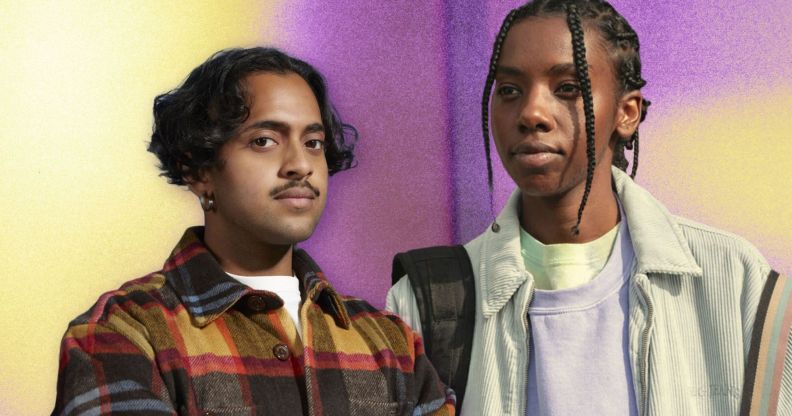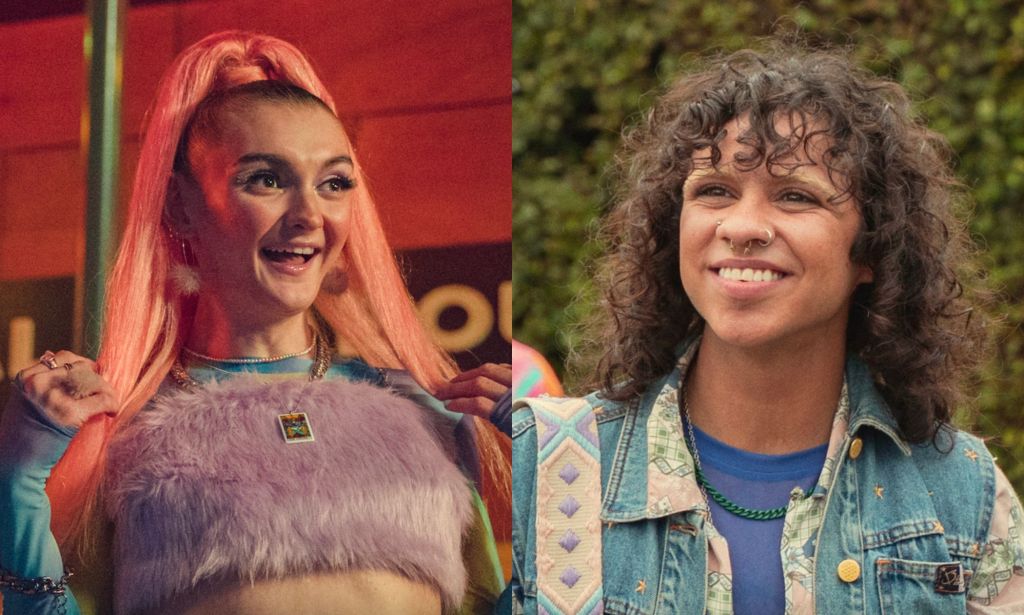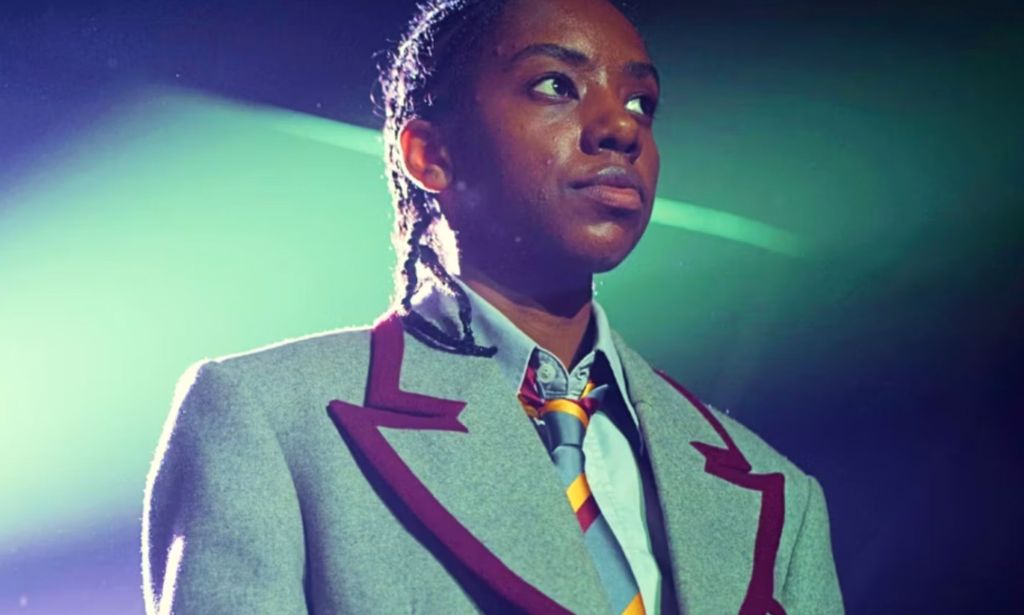How Sex Education season 4 became one of the best examples of trans+ representation in TV history

TV writer Krishna Istha (L) wrote Cal Bowman’s storylines for Sex Education season four. (Netflix/Christa Holka)
Sex Education writer and comedian Krishna Istha talks to PinkNews about how they brought authentic trans and non-binary representation to our TV screens.
Just five minutes into the first episode of Sex Education season four, and Cal Bowman (Dua Saleh), the non-binary student introduced in the previous season, is telling us about the pros and cons of being on testosterone for six months. Facial hair, broader shoulders, bushier eyebrows: pros. An untameable libido, dry skin, excessive sweating: cons.
The scene kickstarts a season that will soon be regarded as one of the most quintessential examples of trans+ representation done right.
As we follow Cal’s journey as a transmasculine non-binary person, viewers learn about their struggle with wait list times and costs of gender-affirming surgery, the dysphoria associated with getting their period, and their attempt to navigate their relationship with their mother.
Plus, Cal isn’t the only character portraying facets of the trans experience. We’re introduced to trans couple Abbi (Anthony Lexa) and Roman (Felix Mufti), two students at Cavendish Sixth Form College, the new school for the former Moordale Secondary crew.

“We early on realised that actually, one non-binary, trans character can’t hold everything,” says TV writer Krishna Istha, who joined the Sex Education writers’ room for season four, and identifies as non-binary and transmasculine. “Which is why there’s Roman and Abbi, to portray the different versions of trans you could be.”
Actors Lexa and Mufti were recruited via an open casting call and, alongside Saleh, helped to put their storylines together. Consultants including trans charity Gendered Intelligence were on hand too, to ensure the storylines were as authentic as possible. “[We were] a community working out what sort of storylines we want to see as trans people,” Krishna adds.
“I feel like it really has a potential to do good,” says Jamie Raines, author of The T in LGBT: Everything you need to know about being trans, of Sex Education’s nuanced trans representation. On YouTube, Jamie has documented his own transition journey to his one million plus subscribers.

Jamie, now 29, realised he was trans aged 16, and says that seeing Cal, Abbi and Roman on his screen would have made his experience easier. “The early days of my transition were very lonely and very scary, and there was nothing in mainstream media that helped with either of those things,” he says.
“Representation matters,” Krishna agrees, “because if you don’t see versions of yourself, you don’t necessarily know that you can exist in that specific way. You might think that you’re [just] one person, when actually lots of different people are having that experience.”
The trans representation in Sex Education feels particularly revolutionary, Jamie explains, because it’s not an exclusively LGBTQ+ show.
“We have amazing shows that have come out more recently that are very accurate and honest to the trans experience,” Jamie says – think RuPaul’s Drag Race or Ryan Murphy’s Pose – “but they are shows that are very much aimed towards a trans or more broadly LGBTQ+ audience specifically. Sex Education is not an LGBTQ+ specific show.”
Cal, Abbi and Roman are likely to be seen by a far broader audience, and might therefore help cisgender fans “to understand a bit more about the ups and downs of trans people’s lives”, Jamie adds.

What Sex Education also gets right is that Cal, Abbi and Roman aren’t defined by their gender identity.
“It’s not just about the transness with Cal, it’s also that they are a bit of an outsider in terms of not entirely fitting in with people,” Krishna says. Away from their gender journey, Cal explores potential new romance and struggles to work out which friendship group they belong to. “It’s not just about their gender. It’s also the sort of vibe they have, and the sort of character they are.”
It’s impossible to discuss the three characters without noting the sociopolitical landscape they exist within. Anti-trans rhetoric, particularly in the UK, is reaching new heights – the latest British Social Attitudes (BSA) survey, released on the same day as Sex Education season four (21 September), shows a marked increase in anti-trans views in the country.
Before audiences could even watch the new season, they were being confronted by this rhetoric. The Guardian’s review of the series drew condemnation on social media for suggesting that the show should have “questioned” the idea of top surgery on “healthy bodies”, instead of allowing Cal to pursue it (the remark has since been removed from the review).
Krishna is of course “nervous” about potential anti-trans backlash to Cal’s storyline, “but at the same time, I think it’s quite important that it exists”.
“The hope is that as much as these characters give comfort for trans and non-binary audiences, that it’s also a place where other audiences can learn about my experience from a true and authentic place,” they add, “as opposed to something that they might have heard from people that don’t necessarily live our life.”
As a viewer, Jamie thinks Sex Education has succeeded in doing just that – it’s the first fictional show he can think of to portray the trans experience in such a broad, nuanced way.
“There was a line from Cal in particular about feeling like trans people aren’t wanted in the world. That got me. I did tear up about that, because it’s something that I’ve thought about, multiple times throughout my transition,” he says.
“Seeing that kind of fictional representation that is done so accurately – it helps alleviate those feelings. I think that would have been the biggest help for me personally, just to be like: ‘Oh, I’m not alone, and it’s OK to be who I am.”
Sex Education seasons one to four are streaming now on Netflix.
How did this story make you feel?

